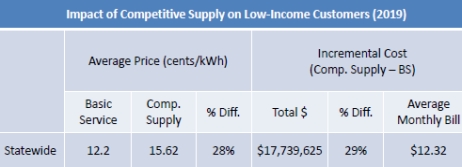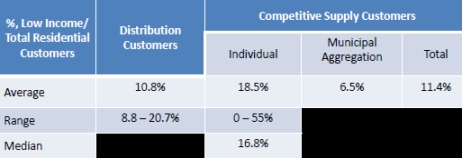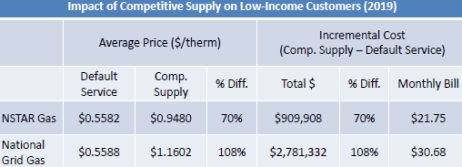|
|
|
|
|
Report: Low-Income Customers On Competitive Supply At Utility Paid 108% More Than Default Service
The following story is brought free of charge to readers by EC Infosystems, the exclusive EDI provider of EnergyChoiceMatters.com
The aggregate cost to low-income natural gas customers on competitive supply at National Grid Gas in Massachusetts was 108% higher than the default service cost, according to a filed presentation from Massachusetts DPU Staff.
DPU Staff's presentation, to be discussed at a December 16 technical session, includes Staff recommendations for product limits and other requirements for suppliers, discussed further below
For electricity, the statewide incremental cost above basic service in 2019 for low-income customers on competitive supply was $17.7 million, with the aggregate competitive supply cost being 29% higher than the basic service cost (or about $12 per month), as shown below:
As shown below, 55% of one retail electric supplier's residential customer base consisted of low-income customers. Low-income customers constitute 9% to 20% of a utility's residential customer base, depending on service area.
For natural gas, at National Grid Gas, the incremental cost above default service in 2019 for low-income customers on competitive supply was $2.7 million, with the aggregate competitive supply cost being 108% higher than the default service cost (or about $30 per month). For natural gas, at Nstar Gas, the incremental cost above default service in 2019 for low-income customers on competitive supply was $900,000, with the aggregate competitive supply cost being 70% higher than the default service cost (or about $22 per month), as shown below:
Staff's presentation includes proposals to address these findings and other issues. Staff stressed that the proposals are those of Department Staff alone, and that the proposals do not
represent the official view of the Department on these
issues
Furthermore, Staff said that the proposals are intended solely to facilitate robust
discussion during this technical session, to allow Staff to
determine the most effective and efficient next steps in
this phase of the retail market investigation
As such, the proposals should be viewed as
"directional", rather than "definitive"
Additionally, Staff said that certain proposals, such as product limitations, may be necessary due to the "immature" nature of the market, but may no longer be necessary if customers were better informed and educated about the competitive market.
"Department staff seeks to work with stakeholders to
develop product limitations that do not intrude on
suppliers’ reasonable business practices, while providing
consumers with protection against unreasonable
practices," Staff said
As such, "A recurring theme in [Staff's proposals] is the issue of
whether the consumer protections that product
limitations would provide could be achieved equally by
increased reporting requirements that would assist the
Department in identifying suppliers whose
'performance' may warrant further scrutiny."
With respect to Staff's specific proposals, Staff said that the low-income (LI) cost data noted above, "raise significant concern regarding the manner in
which the competitive market serves LI customers."
Staff proposes two options to address concerns about low income customers.
Under one option, Staff proposed to establish a product limitation akin to that proposed by Staff during stakeholder process. As first reported by EnergyChoiceMatters.com, Staff proposed that the price to a low-income customer may not exceed the default service rate.
Alternatively, Staff proposed requiring that all suppliers report pricing information on low-income products to assist the Department in identifying suppliers whose "performance" may warrant further scrutiny. Staff suggested that such suppliers may be subject to information/notification requirements (e.g. providing LI customers with information regarding the "premium" they are paying vis-à-vis basic service)
Staff also addressed concerns with variable rate products, regardless of the customer's income level
In terms of variable rate product limitations, Staff proposed two options.
Under Staff's first option, a variable rate may not exceed an established product limitation, such as a to-be-determined percent from the previous month.
Alternatively, Staff proposed requiring all suppliers to report pricing information on monthly price products to assist the Department in identifying suppliers whose "performance" may warrant further scrutiny. Such suppliers may be subject to information/notification requirements (e.g. provide monthly-price customers with information regarding the premium that they are paying vis-à-vis basic service)
Staff also proposed notice requirements for variable rate products.
Staff proposed that suppliers be required to provide notification to customers whenever price increases from one month to the next. This would apply equally to 'tiered' fixed-price products
Staff proposed that uniform requirements be established for suppliers regarding: (i) the timing of posting of upcoming monthly price, and (ii) the vehicle(s) through which these prices will be made available to customers
Staff also proposed rules governing automatic renewals, applicable to products whose original term had a fixed price of at least 6 months
Staff's auto-renewal proposal includes three components:
1. Terms and conditions of new product must remain unchanged
from initial product, except as specified (customer has given
affirmative authorization for specified terms and conditions; Staff said that it is not intuitive that customer seeks/agrees to changes)
• Price structure (fixed-price products can automatically renew only to new fixed-price products)
• Price components (cents per kWh/therm; monthly charge)
• Term
• Renewable content
2. No early cancellation fee, regardless of whether initial product included such a fee
3a. Pricing Limitations (2 options):
i. (a) new price cannot increase by greater than [to be determined]% from the existing price (applies to each
price component); and (b) contract can only be
automatically renewed once; OR
ii. New price cannot exceed 'best available' product price
by greater than [to be determined]%
- OR -
3b. Reporting requirements
• Require all suppliers to report pricing information on
automatic renewal products to assist the Department in
identifying suppliers whose “performance” may warrant
further scrutiny/additional notification requirements
Staff also addressed enroll-by-wallet proposals
Staff noted that the current requirement for a customer account number for an enrollment, "seems to 'force'
suppliers to rely heavily on door-to-door ('D2D') and
telemarketing to enroll customers."
These marketing channels, from Staff’s perspective, "tend to
lend themselves to aggressive/deceptive marketing
practices," Staff said
Department Staff seeks an approach that reduces the
necessity of using these marketing channels, and allows
suppliers to market their products in public settings (
e.g. kiosks)
Setting forth its guiding principles on enrollment information, Staff said that suppliers should be allowed to enroll customers with
personal information that is well- known by the customer,
but not others
However, "Improvements in market efficiency cannot be achieved at
the expense of consumer protections against slamming," Staff cautioned
"One outcome that these principles would preclude is
allowing successful enrollments to be based on
information that is included in the distribution
companies’ Customer Information Lists," Staff said
As previously reported, the DPU is seeking to expand the role of third-party
verification (TPV) in ways that would protect customers from
purchasing supply products about which they are insufficiently
informed. As exclusively first reported by EnergyChoiceMatters.com, Staff has proposed a more "interactive" TPV process which would require customers to accurately state information included on
the Contract Summary Form as a condition for successful enrollment (rather than just answering 'yes')
The December 16 technical session will further discuss this issue
Docket 19-07
ADVERTISEMENT Copyright 2010-20 Energy Choice Matters. If you wish to share this story, please
email or post the website link; unauthorized copying, retransmission, or republication
prohibited.
Regulator's Staff Proposes Product, Rate Increase Limitations; Auto-Renewal Rules
December 15, 2020
Email This Story
Copyright 2010-20 EnergyChoiceMatters.com
Reporting by Paul Ring • ring@energychoicematters.com



NEW Jobs on RetailEnergyJobs.com:
• NEW! -- Retail Energy Account Executive -- Texas
• NEW! -- Supply and Pricing Analyst -- Retail Supplier -- DFW
• NEW! -- Lead Data Analyst
-- Retail Supplier
• NEW! -- Senior Energy Pricing Analyst
• NEW! -- Senior Energy Advisor
• NEW! -- IT Billing Project Manager
• NEW! -- IT Billing Business Analyst
• NEW! -- Financial Analyst -- Retail Supplier -- DFW
• NEW! -- Sr. Energy Intelligence Analyst
• NEW! -- Channel Partner Sales Manager -- Retail Supplier
• NEW! -- Sr. Billing Analyst -- Retail Supplier
• Director of Regulatory Affairs -- Retail Supplier -- Houston
|
|
|
|









